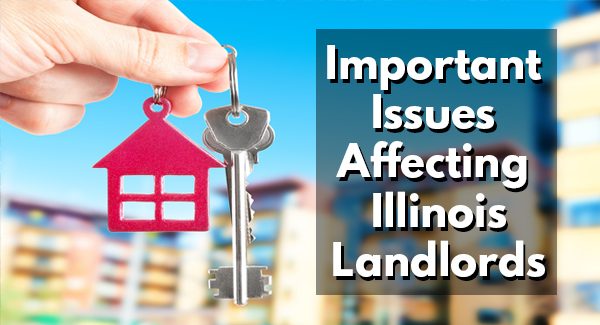Being a landlord and/or manager is a difficult job. There are many complex issues that you deal with on a daily basis. In this second installment, we address four more frequently asked questions. You can record the first three questions here.
Question 4: What kind of policy should we have at the property regarding pets?
The Lease should have a clear and concise policy regarding pets.
- It should identify the amount of pets allowed.
- It should identify the weight limit of each pet.
- It should address what happens if a pet causes a disruption or is disobedient on the premises.
- It should specify the additional security deposit required to keep a pet.
- It should specify if extra insurance is required if a pet bites someone on the premises.
- It should be cognizant of emotional support animals under the Fair Housing Act
Question 5: How do I deal with security deposits?
If you happen to be a landlord in Chicago, security deposits happen to be highly litigated and most commonly violated section of the Chicago Residential Landlord and Tenant Ordinance (CRLTO). Here is a few critical issues pertaining to security deposits:
- In Illinois, security deposits are regulated by the Security Deposit Interest Act and the Security Deposit Return Act. Also the Chicago Residential Landlord and Tenant Ordinance (CRLTO) governs security deposits as it pertains to property in Chicago.
- Security Deposit is defined as any funds held on behalf of the tenant.
- The Chicago Residential Landlord and Tenant Ordinance (CRLTO) imposes strict liability for non-compliant landlords, meaning the consequences are absolute, even if the violation was unintentional.
- When you take a security deposit, you have to provide the tenant with a written receipt that contains the name of the person who received the deposit, the date on which the deposit was received and a description of the rental unit. The tenant must sign the receipt.
- The landlord needs to hold the security deposit in a federally insured, interest-bearing, non-commingled bank account in Illinois.
- In the lease, it should state the name of the financial institution and the address.
- The landlord needs to pay interest as required by the Illinois Security Deposit Interest Act.
- Please note in Chicago, owner occupied buildings of six or fewer units are not required to pay interest on security deposits pursuant to the Chicago Residential Landlord and Tenant Ordinance (CRLTO)
Question 6: When the tenant/s move out, what do I do with their security deposit?
When the tenant/s vacate the unit, there are various steps the landlord needs to take in order to comply with the law. It is very important to follow these steps as you do not want to expose yourself to liability. Please note these steps pertain to property located outside of Chicago. If you have any questions regarding Chicago properties, please do not hesitate to contact KSN for legal guidance.
- The landlord has 45 days to return it after the tenant vacates, not necessarily from the lease termination. The 45 days starts when the tenant vacates the unit.
- If repairs are needed, the landlord has 30 days after the tenant vacates to give the tenant an itemized statement of the damages, a list of actual or estimated cost for repairs, and copies of the receipts for any work that was done.
- If the repairs cannot be done in those 30 days, you have to provide estimated costs for the work and you have an additional 30 days to get it done and provide the actual receipts.
- If the landlord does not provide a letter within 30 days, the landlord must return the entire security deposit to the tenant within 45 days from after the tenant has vacated.
- If the landlord does not return the security deposit, a lawsuit may be filed where you may owe the security deposit, a penalty of two times the deposit, plus attorneys’ fees and court costs.
Question 7: A tenant has made a FHA accommodation request, now what?
FHA issues are highly contested and oftentimes litigated. At KSN, we have an attorney that focuses on these matters. We will briefly detail with a few issues:
- How do these arise? A resident will request an accommodation from the landlord. Each request for an accommodation must be viewed on a case by case basis.
- Definition of “handicap” as a physical or mental impairment that substantially limits a person’s major life activities.
- Parking – Handicapped parking has been found to be a reasonable accommodation.
- Service animals/emotional support animals – The most common request and courts have found that therapy dogs can be a reasonable accommodation. If service/therapy dog is granted as accommodation, the landlord cannot impose pet fees. Additionally, breed, size, or weight limits cannot be applied to service/therapy dog.
If you are a landlord or manager and have concerns regarding these questions and their effect on your property, please do not hesitate to contact Kovitz Shifrin Nesbit at 847-537-0500 or visit our website at www.ksnlaw.com.
Since 1983, KSN has been a legal resource for condominium, homeowner, and townhome associations. Additionally, we represent clients in real estate transactions, collections, landlord/tenant issues, and property tax appeals. We represent thousands of clients and community associations throughout the US with offices in several states including Florida, Illinois, Indiana, and Wisconsin.
This article is made available by the lawyer or law firm publisher for educational purposes only as well as to give you general information and a general understanding of the law, not to provide specific legal advice. By reading this article you understand that there is no attorney client relationship between you and the article author. This article should not be used as a substitute for competent legal advice from a licensed professional attorney in your state. © 2017 Kovitz Shifrin Nesbit, A Professional Corporation.

